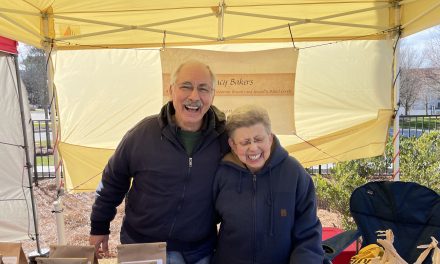As businesses shut their doors and millions lost their jobs, essential workers, including grocery store employees and fast food workers, have ensured society continues moving forward.
Balancing a full course load and a part-time job is challenging in itself, but for the Emory students working on the frontlines, braving a deadly virus to put food on the table for themselves and their families has been excruciating.
Maya Caron (23C), a patient care technician at AdventHealth Hospital in Orlando, Florida, said that working during a

Maya Caron (23C) gearing up for harsh conditions at her hospital job. (The Emory Wheel/Maya Caron)
pandemic has taken an immeasurable toll. As a healthcare worker, she is at a constant risk of being exposed to the virus as it cycles through her colleagues.
With the added responsibility of caring for her grandmother, Caron mentioned that she’s always on high alert for signs of sickness.
“I’ve had a few COVID scares,” Caron said. “Because I have to take care of my grandmother as well, [working] has put a strain on me.”
Battling for both herself and her patients, Caron worries not only for her health, but also her finances. Testing positive would mean a long sick leave, and the backpay from this time off can take months to come in.
“It leads me to think what happens if I get sick,” Caron explained. “I use the money to help my family… and we really need the money.”
Closer to campus, Rolande Kangnigan (23C) said she feels safe working at Panera Bread in Emory Village as a line associate. Kangnigan described a detailed regimen of mask wearing, daily temperature checks before shifts, constant sanitization and strict hand washing.
“Everyone still follows the measures,” Kangnigan said of her coworkers. “No one has begun slacking off.”

Rolande Kangnigan (23C) preparing for her work day at the Emory Village Panera Bread (The Emory Wheel/Rolande Kangnigan)
She emphasized her own personal safety measures, like leaving her work shoes in the car, showering when she gets home from a shift and keeping a close eye on any potential symptoms. For Kangnigan, taking small steps makes a world of a difference.
“I used to [leave my shoes in the car] because of ants attacking the food under my shoes,” Kangnigan said. “But now I think of it as a way of not bringing those germs in the house.”
Still, not every workplace has taken precautions to protect their employees’ wellbeing. Mikahla Gay (21C), a former server at Del Frisco’s Grille in Atlanta, revealed that a lack of proper safety protocols led her to quit.
“Rather than ensuring the safety of guests and staff, management was only concerned with appearing sanitary,” Gay revealed. “[When] they provided masks, gloves and sanitizer to clean the

Mikahla Gay (21C) made the decision to leave her server position at Del Frisco Grille after being put at risk for COVID by her manager. (The Emory Wheel/Mikahla Gay)
tables with, it felt more like a performance for the guests.”
The Centers for Disease Control and Prevention’s recommendations were regularly flouted, she said. Gay recalled attending to parties of more than 20 people and being surrounded by lax coworkers.
“I would always take the cleaning protocols very seriously,” Gay explained. “But my coworkers would say things like, ‘This is just extra work for us’ or ‘I don’t want to do this.’”
Despite changing her own habits to keep germs away from both herself and her family, Gay said that poor management, disinterested coworkers and belligerent guests led her to leave extra income.
“I was just so taken aback,” Gay said. “I felt angry and taken advantage of, so ultimately, I resigned.”
Twisha Dimri (23C) is a sophomore in the college, studying Psychology and Women Gender Sexuality studies. She is originally from New Delhi, India. Apart from writing, Twisha is an actor and a member of Dooley’s Players. In her free time, she enjoys reading, writing poetry and theorizing what Taylor Swift’s songs are about.





